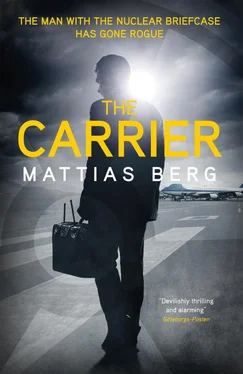Mattias Berg - The Carrier
Здесь есть возможность читать онлайн «Mattias Berg - The Carrier» весь текст электронной книги совершенно бесплатно (целиком полную версию без сокращений). В некоторых случаях можно слушать аудио, скачать через торрент в формате fb2 и присутствует краткое содержание. Город: London, Год выпуска: 2019, ISBN: 2019, Издательство: MacLehose Press, Жанр: Триллер, на английском языке. Описание произведения, (предисловие) а так же отзывы посетителей доступны на портале библиотеки ЛибКат.
- Название:The Carrier
- Автор:
- Издательство:MacLehose Press
- Жанр:
- Год:2019
- Город:London
- ISBN:978-0-85705-788-4
- Рейтинг книги:4 / 5. Голосов: 1
-
Избранное:Добавить в избранное
- Отзывы:
-
Ваша оценка:
- 80
- 1
- 2
- 3
- 4
- 5
The Carrier: краткое содержание, описание и аннотация
Предлагаем к чтению аннотацию, описание, краткое содержание или предисловие (зависит от того, что написал сам автор книги «The Carrier»). Если вы не нашли необходимую информацию о книге — напишите в комментариях, мы постараемся отыскать её.
The Carrier — читать онлайн бесплатно полную книгу (весь текст) целиком
Ниже представлен текст книги, разбитый по страницам. Система сохранения места последней прочитанной страницы, позволяет с удобством читать онлайн бесплатно книгу «The Carrier», без необходимости каждый раз заново искать на чём Вы остановились. Поставьте закладку, и сможете в любой момент перейти на страницу, на которой закончили чтение.
Интервал:
Закладка:
My watch showed 09.56, September 11, 2013. Twelve years since we got our blank check to do whatever we wanted, with the entire so-called international community on our side. And more than a day since Ingrid slipped into a rehabilitation-induced lethargy, after extricating me from the glass display case.
Eventually I gave up reading, had no choice but to linger in this uncertainty, and put the leaflet back in my combat pack. Instead—to distract myself—I took a closer look at Jesús María’s strange piece of fabric. Tried to understand what it was that had enveloped me in the glass case. To follow the detailed instructions which Jesús María must have written on the black fabric while she was waiting for us the other night, with arrows and dashed lines in what looked like chalk.
Fold here. Pull the zipper up along edge “A” and bring it to opposing edge “C”, then fold into “F”. The briefcase goes in the pouch which this creates—and the combat pack in the compartment on the underside. If you do this right, the decals will appear on the outside of the upper pocket. And just be aware that I’m bored to death, Erasmo. You’re taking forever!
But in spite of all my efforts, I could not bring together what Jesús María had called THE HYBRID. In enormous capital letters all the way across the long side “E”. So when Ingrid finally woke up I was forced to ask her for help. It was immediately apparent that she was familiar with the way Jesús María thought, her twisted creativity, clearly on a level with her own. After an hour or so we had managed to assemble the strange construction. A sort of combination of case and backpack—with the capacity not only to hold but also to be both.
“This is how Jesús María passes the time. The art of folding, like origami, or a traditional Japanese kimono. Clothes which can take a day to put on and which at the same time become some sort of ceremonial armament. Equipment which is indistinguishable from its structure, where surface and what lies beneath constantly change places.”
She put the empty contraption on my back, tightened the straps, found the exact balance. It was both incredibly light and surprisingly heavy. Like silk with steel or lead woven into it, a mythical hero’s armor. In some way the weight gradually spread across my back until I no longer noticed it.
Ingrid lifted in first the briefcase and then the combat pack, each in its designated compartment. Both of these bulky objects disappeared almost without trace, swallowed up by the shapeless and more or less organic hybrid. The difference between having zero and 110 pounds in there was bewilderingly small. Then she also took my weapon and put it in its dedicated place: a long narrow compartment at the side, hidden yet easily accessible.
I put the hybrid on the ground, walked around it with Ingrid to examine how it was constructed. The combat pack and my nuclear football had not exactly become one—but rather something new, a third something. There were compartments everywhere, zips, possibilities, alternatives. There was also a clever little hole for the security strap of the briefcase, so that I could still keep it over my wrist, even with the hybrid on my back.
But the decals were the cherry on top, Jesús María’s ironic nod toward this whole business. Using satire to disarm history’s heaviest weapon.
Because her experimental carrying equipment, which now held the “most important object in the world”, was covered on top with bits of fabric from foreign cities in typical ’60s and ’70s style. The name of each place plus a kitschy little textile design image—of just the kind one had on backpacks and padded jackets in my childhood.
Rich kids could buy “St Moritz” or “Chamonix” on their ski trips with their parents. Soon they added “London”, “Rome” and “Paris”, perhaps, from their solo educational trips in Europe. I was given “Aspen” and “Niagara Falls” by some distant relatives.
Now Jesús María had recreated these very decals, together with some other less usual ones, and sewn them onto the hybrid. The camouflage was perfect. Even a trained eye would not see more than a gigantic travel backpack of the old sort, plucked out of the cellar after many years.
It was still hard to talk, my whole face was too tight. My lips felt grotesque. Only if I formed my words at the very front of my mouth could I manage a sentence—but that was enough to express my unconditional surrender.
“She’s good.”
“Isn’t she just, Erasmus? The world lost out on a major artist.”
“How did she get hold of the material?”
With a sweeping gesture, Ingrid indicated the rock chamber’s south-east corner. Only when I let my headlamp light up the darkness could I see the broken office chairs which had been stacked there, higgledy-piggledy. As well as the mess next to them: tattered yellow rubber gloves for sun, torn blue hospital blankets for sea. The white stuffing from the chairs must have been the snow in the decals.
“Composite materials, you might say. Wrecked goods, like the woman herself.”
“You mean that Jesús María made the decals with her own hands?”
“Mmm… Jesús María has the memory of an elephant. Way too much so for her own good.”
I bent down and lifted the hybrid onto my back again.
“But it was I who asked her to make that for you, Erasmus, so you can disguise the briefcase and have both hands free from now on. I can guarantee you’ll need them.”
“She does what you tell her?”
“On odd days. On even ones she does different things.”
“So which was it yesterday, when she shut me in with the apes?”
“Oh, don’t take that too personally, my treasure. Jesús María gets confused between different men. She lives in her past.”
2.08
Those who have not lived through it think that sabotage, military offensive, counter-attack, not to mention war, are explosive occurrences. That everything unfolds in rapid sequences of endlessly dramatic movement. In fact, there is mostly immobility.
Edelweiss used to preach that we had to anticipate nothing just as watchfully as absolutely anything . The nuclear weapons system is based on this. The mere fact that it is there creates a sort of existential half-way house, where one is constantly as close to war as one can be, even during times of peace: however low the alert level is. The wet-behind-the-ears recruits who are sitting there furthest down in the bed-rock—in the indescribable solitude of the missile silos—have to guard the Dragon with the same vigilance at the lowest level of military preparedness as at the highest, because the system itself is by far the greatest potential danger. All day long. The whole year. Decade after decade.
And it was in just such an existential no-man’s-land, a gap in both time and space, where we now found ourselves. Ingrid said that we should take the chance to rehabilitate ourselves while we could. Before she was ready with her planning; before she gave us our marching orders.
So while she continued clicking away on the portable command terminal or practiced her yoga—the asanas which had names like “Warrior”, “Destroyer of the Universe” or “Corpse Pose”, defied description—I picked up my strength training again. Running was only a distant dream, really to be able to stretch out, lengthen my stride, push my body to the limit.
According to Ingrid, Jesús María did nothing physical: needed no training, since her fuel consisted only of dark matter. Pure vengeance. Unclouded hatred. We did not see much of her either, apart from when—once a day at most—she opened the protective doors to her inner rock chamber and came out to help herself to some of the masses of food that Sixten had put in our refrigerator. Like the rest of the machine park it seemed to have been left behind from the ’60s.
Читать дальшеИнтервал:
Закладка:
Похожие книги на «The Carrier»
Представляем Вашему вниманию похожие книги на «The Carrier» списком для выбора. Мы отобрали схожую по названию и смыслу литературу в надежде предоставить читателям больше вариантов отыскать новые, интересные, ещё непрочитанные произведения.
Обсуждение, отзывы о книге «The Carrier» и просто собственные мнения читателей. Оставьте ваши комментарии, напишите, что Вы думаете о произведении, его смысле или главных героях. Укажите что конкретно понравилось, а что нет, и почему Вы так считаете.












